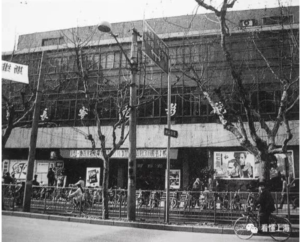1956 Shanghai, China
Yuling Cheng
1935
Shanghai, China
Interviewed on September 19, 2019
by Jenny Cheng
Back in the 1950s or 60s, Shanghai built its first movie theaters. There were two of them, to be exact, one called Heng Shan Theater and the other Chang Ning Theater (both named after the regions the theaters were physically located at). These two theaters were constructed and ran on the contributions from the people in the surrounding neighborhoods and, of course, the government. I was also a small shareholder, and somehow I got chosen as a shareholder representative for Chang Ning Theater.
As a representative, I had to attend meetings in the theater every few months or so. The ones in charge of the theater would send us a meeting invitation or notice, along with a free movie ticket, through the mail. In that sense, I didn’t really go to the theater for the movies; the movies were more like a gift to thank us for taking our time to attend the meetings. So I would go to a meeting to hear about recent updates on how the theater had spent the funds, and watch a complimentary movie after by myself before heading back home. I didn’t feel like seeing a movie was a big deal even back then. At least I watched them as a casual leisure activity, never really gotten super excited from them or looked forward to going to the theater. My family members and friends never really asked about the movies I watched either, and I didn’t purposely bring them up like “Oh, I watched this interesting film yesterday. It talked about… ”. Movies were just not a topic to come up in our daily conversations. I guess this could be a reason why I can’t really recall much of the plots from films.
Chang Ning Theater was quite close to where my family lived back in the day. I always went there by foot since bikes were considered as luxuries back then. The walk took about 20 minutes, which was not bad at all. I had just graduated middle school and started working when the theater finished construction and had its grand opening in 1952. The theater itself was quite similar to the movie theaters nowadays in Shanghai. The screening hall was big and could fit a lot of people – definitely way more than a hundred. The seats were cushioned and arranged in rows with the back rows on higher grounds. There were balcony areas too, with the same seats. The film was projected onto a huge, rectangular piece of white cloth, and the speakers, which were shaped like horns, were placed above, behind, and on both sides of the cloth. Tickets were very cheap back in the day: you could get one for around a few cents, and they never really sold out completely. People either bought tickets at the front right before the screening, or purchased one or two days in advance from the same box office. The tickets usually marked specific seatings for the ticket holders, but no one really followed it; people just sat wherever they wanted to based on a first-come-first-serve order since the theater was rarely filled. There were no concessions.
The first movie I remember seeing – probably not the actual first movie I saw, since it’s been like 50, 60 years – was a historical war film called Shang Gan Ling (Battle on Shangganling Mountain). I watched it for free after one of those meetings for representatives. The story was based on a real battle during the Korean War between the United States and North Korea. The Korean War was one of the most significant wars in Chinese history, and Chairman Mao lost his oldest son in this war, so you can imagine the scale of it. The main characters were war heroes, whose names I can’t quite recall, from the People’s Volunteer Army. The details of the film are blurry now, but it described a Chinese victory over an American invasion – I remember feeling patriotic after watching the movie. I was, I think, 21 years old when I saw this. But to be honest, rather than the characters or the plot, I had the most impression on the theme song. I can still vaguely remember the tune and the lyrics (*hummed a little). My friends and I used to sing it together too. The song became more popular than the movie – almost everyone knew it at the time, and it’s still one of people’s favorite classics till this day.
I watched around eight to ten movies for free during the years, and after they took down Chang Ning Theater to construct subway line 2, I haven’t really seen a film since. For many Shanghainese my age, Chang Ning Theater is forever a gem in our memory. It’s just a nice and special place – and that’s coming from someone like me who never really had a passion for movies.

Chang Ning Theater before removed
